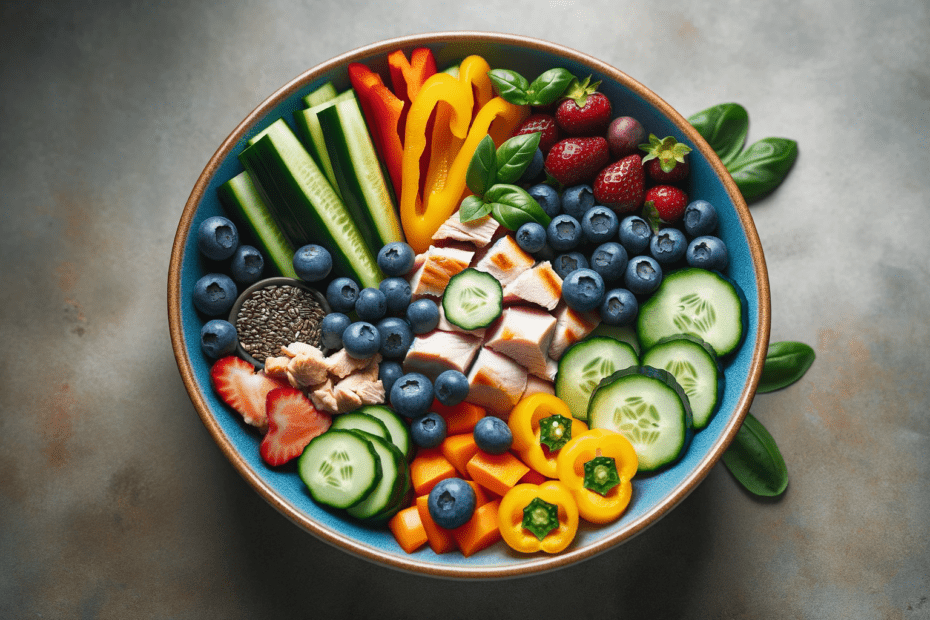Are you wondering what to feed your furry friend for optimal health? Look no further! In this article, we will reveal the four best foods that will keep your dog happy and healthy.
Packed with protein-rich meats, omega-3 fatty acids, antioxidant-loaded fruits and vegetables, and gut-friendly probiotics and prebiotics, these foods are sure to provide your canine companion with all the essential nutrients they need.
So, let's dive in and discover the secret to your dog's well-being!
Key Takeaways
- Protein-rich meats are essential for overall dog health, supporting muscle development, immune function, and tissue repair.
- Omega-3 fatty acids, found in fish oil supplements or fatty fish, improve skin and coat health in dogs.
- Antioxidant-packed fruits and vegetables, such as blueberries, spinach, sweet potatoes, and carrots, can neutralize harmful free radicals in dogs' bodies.
- Probiotics and prebiotics, found in pet foods or supplements, promote a healthy gut, improve digestion, and support the immune system in dogs.
Protein-Rich Meats
You should feed your dog protein-rich meats to ensure optimal health. Protein is essential for your dog's overall health and well-being. It plays a critical role in muscle development, immune function, and the repair of tissues. Protein-rich meats are a great source of this vital nutrient.
When it comes to choosing the best dog food, it's important to consider grain-free options and alternative protein sources. Grain-free options are becoming increasingly popular as they cater to dogs with grain allergies or sensitivities. These options often use alternative protein sources such as chicken, beef, lamb, or fish. These meats aren't only rich in protein but also provide essential amino acids that are necessary for your dog's growth and development.
When selecting protein-rich meats for your dog, it's important to choose high-quality sources. Look for meats that are lean and free from additives and preservatives. Avoid meats that are high in fat, as excessive fat intake can lead to weight gain and other health issues.
Omega-3 Fatty Acids
To further enhance your dog's optimal health, incorporate omega-3 fatty acids into their diet. Omega-3 fatty acids offer numerous benefits for dogs, including improved skin and coat health, reduced inflammation, and enhanced cognitive function.
Here's how you can incorporate these essential nutrients into your dog's diet:
- Fish Oil Supplements: Consider adding fish oil supplements to your dog's meals. These supplements are rich in omega-3 fatty acids and are available in liquid or capsule form. Make sure to choose a high-quality supplement specifically formulated for dogs.
- Fatty Fish: Another way to introduce omega-3 fatty acids is by feeding your dog fatty fish such as salmon, sardines, or mackerel. These fish aren't only a great source of omega-3 fatty acids but also provide other essential nutrients like protein and vitamin D.
- Flaxseed: Ground flaxseed is an excellent plant-based source of omega-3 fatty acids. You can sprinkle a small amount of flaxseed over your dog's food to increase their intake of these beneficial nutrients.
- Fortified Dog Food: Some commercial dog foods are fortified with omega-3 fatty acids. Check the labels and choose a high-quality dog food that includes these essential nutrients.
Incorporating omega-3 fatty acids into your dog's diet can have a positive impact on their overall health and well-being. Consult with your veterinarian to determine the best approach and dosage for your furry friend.
Antioxidant-Packed Fruits and Vegetables
To continue promoting optimal dog health, incorporate antioxidant-packed fruits and vegetables into their diet. These natural foods aren't only delicious but also provide a wide range of nutritional benefits for your furry friend. Organic produce is particularly beneficial as it's free from harmful pesticides and chemicals that can be found in conventionally grown fruits and vegetables. By choosing organic options, you ensure that your dog receives the purest and most nutritious form of these antioxidant-rich foods.
Antioxidants play a crucial role in maintaining your dog's overall health. They help neutralize harmful free radicals in the body, reducing the risk of chronic diseases and promoting a strong immune system. Fruits and vegetables such as blueberries, spinach, sweet potatoes, and carrots are excellent sources of antioxidants that can improve your dog's overall well-being.
Incorporating natural supplements into your dog's diet can also provide additional health benefits. Supplements like cranberry extract and turmeric can support urinary tract health and reduce inflammation, respectively. However, it's important to consult with your veterinarian before introducing any new supplements to ensure they're safe and appropriate for your dog's specific needs.
Probiotics and Prebiotics
Incorporating probiotics and prebiotics into your dog's diet can greatly support their digestive health and overall well-being.
Probiotics are beneficial bacteria that help maintain a healthy balance in the gut, while prebiotics are non-digestible fibers that provide nourishment for these bacteria.
The benefits of probiotics for dogs are numerous. They can help improve digestion by breaking down food and absorbing nutrients more efficiently. Probiotics also support the immune system, as a large portion of the immune system is located in the gut. By promoting a healthy gut microbiome, probiotics can help prevent gastrointestinal issues such as diarrhea and constipation. Additionally, probiotics have been shown to alleviate symptoms of allergies and skin conditions in dogs.
On the other hand, prebiotics play an important role in canine health as well. They act as food for the probiotics, helping them thrive and multiply in the gut. By stimulating the growth of beneficial bacteria, prebiotics contribute to a healthier digestive system. They also aid in the absorption of essential nutrients, promote regular bowel movements, and may even reduce the risk of certain diseases.
To incorporate probiotics and prebiotics into your dog's diet, look for pet foods that contain these ingredients or consider adding a probiotic or prebiotic supplement. Always consult with your veterinarian before making any changes to your dog's diet to ensure they receive the appropriate dosage and type of probiotics and prebiotics for their specific needs.
Frequently Asked Questions
Can Dogs Consume Plant-Based Proteins Instead of Protein-Rich Meats for Optimal Health?
Dogs can consume plant-based proteins as alternatives to meat for optimal health. While they provide essential nutrients, it's important to consider the benefits and drawbacks. Animal proteins play a significant role in their diet, impacting overall health.
Are There Any Risks Associated With Feeding Dogs Too Many Omega-3 Fatty Acids?
Feeding your dog excessive omega-3 fatty acids can lead to health risks such as diarrhea, vomiting, and blood clotting disorders. It's important to balance their diet with alternative protein sources like plant-based proteins for optimal health.
Which Fruits and Vegetables Are the Highest in Antioxidants for Dogs?
To ensure your dog gets the best nutrition, it's important to include fruits and vegetables with high antioxidant content in their diet. Antioxidants play a crucial role in promoting optimal health for your furry friend.
Can Dogs Consume Probiotics and Prebiotics in the Form of Supplements Instead of Natural Sources?
Yes, dogs can consume probiotic and prebiotic supplements instead of relying solely on natural sources. These supplements can help support their digestive health. Additionally, there are plant-based protein alternatives available for dogs.
How Can I Incorporate a Variety of These Foods Into My Dog's Diet to Ensure They Receive All the Necessary Nutrients?
To ensure your dog receives all necessary nutrients, incorporate a variety of foods into their diet. This will provide nutritional balance and support their overall health. Consider including lean proteins, fruits and vegetables, whole grains, and healthy fats.
Conclusion
In conclusion, incorporating protein-rich meats, omega-3 fatty acids, antioxidant-packed fruits and vegetables, as well as probiotics and prebiotics into your dog's diet can significantly contribute to their optimal health.
These essential nutrients support their overall well-being, promote a healthy coat and skin, boost their immune system, and aid in digestion.
By providing a balanced and nutritious diet, you can ensure that your furry friend enjoys a long and happy life.






